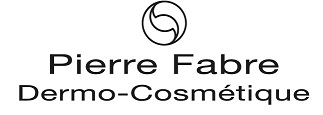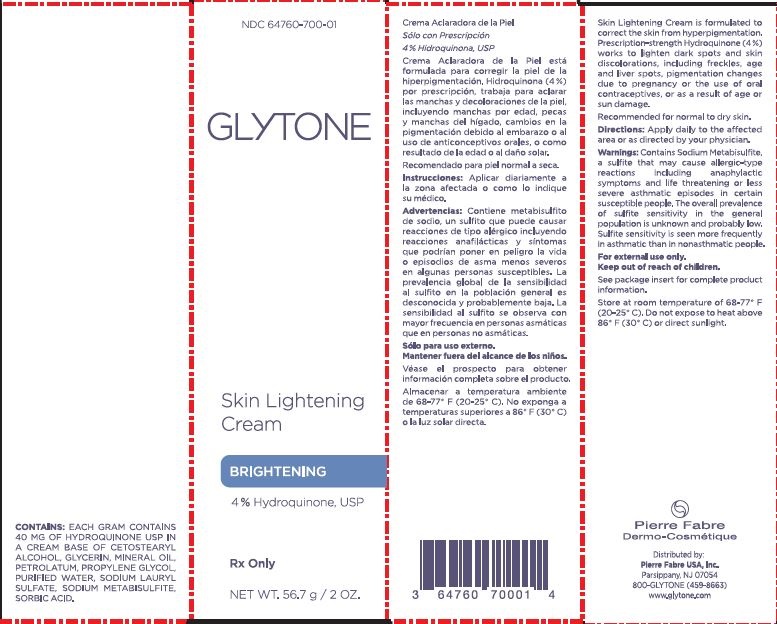GLYTONE SKIN LIGHTENING- hydroquinone cream
Pierre Fabre USA Inc.
Disclaimer: This drug has not been found by FDA to be safe and effective, and this labeling has not been approved by FDA. For further information about unapproved drugs, click here.
----------
GLYTONE Hydroquinone USP, 4% Skin Lightening Cream
Glytone
HYDROQUINONE USP, 4%
Skin Lightening Cream
Rx Only
FOR EXTERNAL USE ONLY
NOT FOR OPHTHALMIC USE
I. DESCRIPTION
Each gram of Glytone Hydroquinone USP, 4% Skin Lightening Cream contains 40 mg of Hydroquinone USP in a cream base of Cetostearyl Alcohol, Glycerin, Mineral Oil, Petrolatum, Propylene Glycol, Purified Water, Sodium Lauryl Sulfate, Sodium Metabisulfite, and Sorbic Acid. The chemical name for hydroquinon is: 1,4-benzenediol. The molecular formula is C 6H 6O 2 and molecular weight is 110.11. Hydroquinone has the following structural formula:

II. CLINICAL PHARMACOLOGY
Topical application of hydroquinone produces a reversible depigmentation of the skin by inhibition of the enzymatic oxidation of tyrosine to 3,4-dihydroxyphenylalanine (dopa) and suppression of other melanocyte metabolic processes. Exposure to sunlight or ultraviolet light will cause repigmentation of the treated areas.
III. INDICATIONS AND USAGE
Glytone Skin Lightening Cream is indicated for the gradual lightening of hyperpigmented skin conditions such as chloasma, melasma, freckles, senile lentigines, and other unwanted areas of melanin hyperpigmentation.
IV. CONTRAINDICATIONS
Prior history of sensitivity or allergic reaction to this product or any of its ingredients. The safety of topical hydroquinone use during pregnancy or in children (12 years and under) has not been established.
V. WARNINGS
A. Contains sodium metabisulfite, a sulfite that may cause allergic-type reactions (e.g. hives, itching, wheezing, anaphylaxis, severe asthma attack) in certain susceptible persons. The overall prevalence of sulfite sensitivity in the general population is unknown and probably low. Sulfite sensitivity is seen more frequently in asthmatic than in nonasthmatic people.
B. May produce exogenous ochronosis, a gradual blue-black darkening of the skin, the occurrence of which should prompt discontinuation of treatment.
C. There are no sunscreen agents in Glytone Skin Lightening Cream. Since minimal sunlight exposure may reverse the lightening effect of this preparation, an effective broad spectrum sunscreen should be used during the day, and unnecessary sun exposure avoided, or sun-protective clothing should be worn to cover treated areas in order to prevent repigmentation from occurring.
For daytime lightening of unwanted hyperpigmented areas, Glytone SunVanish Skin Lightening Cream Broad Spectrum SPF 25 should be considered.
VI. PRECAUTIONS
SEE WARNINGS
A. Test for skin sensitivity before using Glytone Skin Lightening Cream by applying a small amount to an unbroken patch of skin and check in 24 hours. Minor redness is not a contraindication, but where there is itching or vesicle formation or excessive inflammatory response, further treatment is not advised. Close patient supervision is recommended.
Hydroquinone is a skin lightening agent which may produce unwanted cosmetic effects if not used as directed. The physician should be familiar with the contents of this insert before prescribing or dispensing this medication.
B. Avoid contact with eyes, nose, mouth, and lips. In case of accidental contact, patient should rinse thoroughly with warm water and contact a physician.
C. Keep this and all medication out of the reach of children. In case of accidental ingestion, call a physician or a poison control center immediately.
D. Pregnancy Category C. Animal reproduction studies have not been conducted with topical hydroquinone. It is also not known whether hydroquinone can cause fetal harm when used topically on a pregnant woman or affect reproductive capacity. It is not known to what degree, if any, topical hydroquinone is absorbed systemically. Topical hydroquinone should not be used on pregnant women.
VII. ADVERSE REACTIONS
No systemic adverse reactions to hydroquinone have been reported. Occasional hypersensitivity (localized contact dermatitis) may occur in which case the medication should be discontinued and the physician notified immediately.
Sensitivity to sodium metabisulfite is a potential. See WARNINGS.
VIII. OVERDOSAGE
There have been no systemic reactions from the use of topical hydroquinone. However, treatment should be limited to relatively small areas of the body at one time since some patients experience a transient skin reddening and a mild burning sensation which does not preclude treatment, but indicates caution is warranted.
IX. DRUG DOSAGE AND ADMINISTRATION
Glytone Skin Lightening Cream should be applied daily at night to affected areas and rubbed in well, or as directed by a physician. If no lightening effect is seen after 2 months of treatment, use of this product should be discontinued. During the day, avoid sunlight exposure to treated areas by using an effective broad spectrum sunscreen (SPF 15 or higher) or by wearing sun-protective clothing.
X. HOW SUPPLIED
Glytone Hydroquinone USP, 4% Skin Lightening Cream is available as follows
| Size | NDC Number |
| NET WT. 2 OZ. / 56 g tube | 64760-700-01 |
Store at room temperature of 68-77° F (20-25° C). Do not expose to heat above 86° F (30° C) or direct sunlight.

Distributed by:
Pierre Fabre USA, Inc.
Parsippany, NJ 07054
1-800-GLYTONE (459-8663)
www.glytone.com
83931L
| GLYTONE SKIN LIGHTENING
hydroquinone cream |
||||||||||||||||||||||
|
||||||||||||||||||||||
|
||||||||||||||||||||||
|
||||||||||||||||||||||
|
||||||||||||||||||||||
|
||||||||||||||||||||||
| Labeler - Pierre Fabre USA Inc. (117196928) |
 NDC 64760-700-01
NDC 64760-700-01